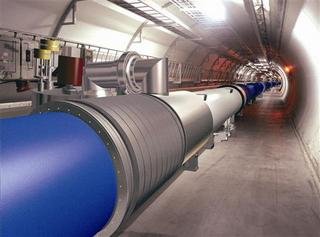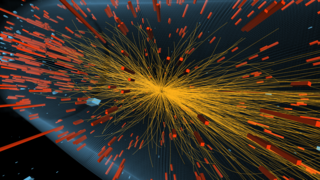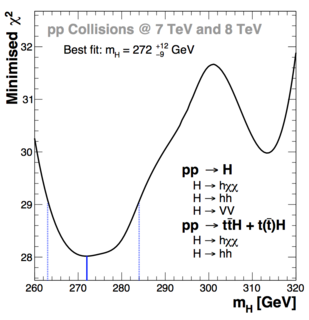The South African Madala boson strikes back (and is still very alive)
The Madala boson hypothesis was formulated by a small group of physicists two years ago. The idea was to explain various strange effects observed in data recorded during the first Run of the Large Hadron Collider, the LHC, at CERN.

[image credits: CERN]
In a few words, this new boson is a kind of heavy cousin of the Higgs boson with different properties.
Adding this boson to the theory allows one to fit the LHC Run I data in a better way than as within the Standard Model of particle physics alone.
However, two years ago, there was not enough information collected by the LHC to be able to either reject the guy or definitely confirm its existence.
Today, more data is available, as the second run of the LHC is on-going. It is thus timely to confront the Madala boson hypothesis to fresh data and see whether it survives or whether it should be sent to the graveyard of dead theories.
This is what has been done in this paper that I have read at the end of last week.
THE MADALA STORY - THE SETUP
The story of the Madala boson starts with data recorded during the LHC Run I, and the investigation of Higgs results.

[image credits: CERN]
A bunch of researchers from Johannesburg started to re-analyze eight of the LHC analyses connected to the Higgs boson.
First, it is important to recall that the results of all these eight analyses were found in perfect agreement with the Standard Model of particle physics.
However (there is always a ‘however’), data comes with error bars, as for the theory predictions. We must thus be very careful with the interpretation of the results (in particular when one claims for a discovery or the rejection of a hypothesis).
Even if data and the Standard Model were agreeing with each other pretty well, the confrontation of the theory to the experimental results was not able to fully exclude the presence any non-standard effect.
THE ORIGIN OF THE MADALA BOSON HYPOTHESIS
The results of the eight chosen analyses were actually exhibiting a bunch of interesting features and excesses that would deserve a deeper look.
This is how the story really started. The South African researchers were planning to confront a new physics model to data, to see whether any improvement regarding the strange features was in order.
But what was this model?

[image credits: homemade]
The model under consideration is very simple. We take the Standard Model and extend it with one new scalar boson ‘H’.
The capital ‘H’, that is a slightly different symbol as the one used for the Higgs boson (‘h’), can be seen as a second Higgs boson and has been named by the South African researchers the Madala boson.
Moreover, the model also features a dark matter candidate that is connected to both the Madala boson and the Higgs boson.
It was hoped that having both a Madala boson and a dark matter particle would help to get a better agreement between the observed properties of the Higgs boson and the theory.
I however insist once again, the theory-data agreement without the dark matter and Madala guys is already pretty good. We are talking about trying to improve things here.
THE MADALA THEORY AND THE LHC RUN I DATA
A couple of years ago, the results of the exercise have been published here. The findings were very interesting and are summarized in the picture on the right.

[image credits: arXiv:1506.00612]
When the Madala theory is confronted to data, it turns out that there is a preferred value for the mass of the Madala boson H of around 270 GeV. This is more than twice the mass of the Higgs boson.
Just be explain a little bit more: the best fit value on the figure on the right is the minimum of the chi-square curve.
The conclusions of their article were pretty clear: extending the Standard Model of particle physics by a new heavy scalar boson and a dark matter particle allows to improve the agreement between theory and data. The preferred mass value for the Madala boson is found to be 270 GeV.
One important question remained at that time: although the agreement with data was better, there was no direct evidence in the LHC Run I data to support the existence of the hypothetical Madala boson.
THE MADALA THEORY AND THE FRESH LHC RUN II DATA
In the article that I have read last week, the same group from Johannesburg investigated whether the Madala hypothesis was surviving LHC Run II data collected so far. They explored this time both Run I and Run II Higgs results.
What they found is that the new best fit value is compatible with the Run I results taken alone, once uncertainties are accounted for. It also seems that the no-Madala-boson hypothesis is disfavored with respect to the Madala-boson-hypothesis.
Once again, it is still to early to be able to firmly disentangle the two hypotheses, but what is important to bare in mind is that the Madala model is still well alive.
SUMMARY AND REFERENCES
In this article, I discussed a few mild anomalies in LHC Higgs boson data. While those anomalies are compatible with the Standard Model of particle physics when uncertainties are accounted for, it is interesting to double check which room is left for having some new phenomena hidden there.
This is the whole story of the Madala boson hypothesis. We take the Standard Model, add a heavy cousin of the Higgs boson and a dark matter candidate. We mix everything and confront it to data. In this case, an improvement with respect to the Standard Model is found. However, it is still too early to claim for anything: we are still missing a direct observation of the new boson. This will maybe (or maybe not) come in a couple of years… We need in any case to stay tuned! :)
One image has nothing to do with the topic. A small reward for who finds it (and give the reason why it has nothing to do with the post)!
For more information, I recommend to read the original Madala boson article available in open access here, as well as the update with respect to fresh data available there.
For more discussion on this topic (or anything related to science), please join us on steemSTEM. SteemSTEM is a community driven project which seeks to promote well written/informative Science Technology Engineering and Mathematics postings on Steemit. More information can be found on the @steemstem blog.
The second image is of proton-lead collisions that resulted in a QGP being observed in proton-proton and proton-nucleus collisions which were not expected, since there they expected a lower order of magnitude in size collisions.
Wtf, how come is an H for the madala? isn't the h for supersymmetry stuff, I checked again. Are you trying to get killed? (joking)
No, in all seriousness I know nothing of particle physics but the idea of some way to interact with dark matter if it turns out to be true is interesting but most likely someone jumped the gun.
Ahaha we have a winner here. The post is about proton-proton collisions and not about heavy ion stuff! A small upvote for you ^^
In the Standard Model, there is a single Higgs boson so that the letter 'h' or 'H' is used equivalently. In supersymmetry, you have at least 5 Higgs bosons. In the minimal supersymmetric standard model, there are hence 'h0', 'H0', 'A0', H+ and H-. The small h is the standard-model-like Higgs boson and the capital H is its cousin.
Actually, in models with an extended Higgs sector, this h/H naming scheme is very common. This is why the Madala is named H: it is another Higgs boson after all, nothing more.
This is at the basis of many dark matter models. You have a mediator linking the dark matter to the standard model sector. Here, the Madala is this mediator. :)
Great post
Wow alot of info here, honestly i dont understand it all but what i do is very interesting.
If you have heard about the Higgs boson, this post should be pretty okay to follow. At which part are you lost, so that I could help you?
Is it not a done deal that dark matter is made of neutrinos and gravitons and/or gravity waves?
Actually... not at all. You sentence actually does not make much sense. Do you minding letting me know where you have actually read that?
I never read it as a claim, but I did hear on PBSSpaceTime that neutrino is a candidate for dark matter.
Why did my sentence make no sense at all?
Do Gravity waves lack mass?
Okay let me try to answer (please don't hesitate to come back to me if necessary). :)
Neutrino are massive weakly interacting particles, and therefore a potential candidate for dark matter. However, the calculations show that their contribution to dark matter is by far not sufficient. Conclusion: we need something else, and this is this something else that is usually called dark matter. Is it clearer?
Gravity waves are created from the conversion of some mass. But you need a huge amount of it, which is why black hole or dense star mergers are the only potential candidates that could yield an observation. The only connection with dark matter is that primordial black hole could contribute to dark matter. Hopefully, future gastrophysics observations will let us know more on that.
.Your reply is both clear and clarifying except from this sentence:
"Gravity waves are created from the conversion of some mass."
Do you mean from the gravitational interaction of moving masses?
By some mass, I meant some given amount of mass that is converted into energy (spread into the waves). Is it better?
This comment has received a 20.00 % upvote from @upgoater thanks to: @stimialiti.
The new and improved version of the LHC will be creating energy collisions with stronger than any that have ever been achieved on Earth before. It does this by generating beams of protons — the positively charged particles in an atom — and hurling them around a 17-mile loop to reach nearly the speed of light.
We will have t wait a little bit for the high-lumi LHC (I don't know whether this is what you are talking about). The current Run II is already not too bad, with an increased collision energy of 13 TeV. Here, it is enough to focus on the present (before considering the future) :)
wow super interesting, next level for sure
Next level? Would you mind being more specific in defining the 'level' concept ? Thanks in advance. I must have missed something. ^^
its a figure of speech used on the internet a lot now, catch up lol.
It probably came from the level system in video games. In a lot of internet culture now everything is categorised into levels/tiers. Instead of strong we could say high tier for example
Thanks. Now I am totally feeling old :D
that's what you get for ageing >:)
Yep, this is well deserved I guess ;)
is not a "level" per say, it's just that the way you explain it gives more clarity. I meant a "level of understanding" hopefully this make sense, you haven't missed anything :) great article, thanks for sharing!
Oooh then thanks for your explanation. I was definitely missing something ;)
:)
@lemouth, good work, and this is a good analysis of a theory. I am very interested in expanding the theory that is already rather than creating a new theory, with an analysis of the flaws and advantages of a theory. because basically, a theory is built on assumptions.
Well, any new theory must include the Standard Model somehow, so that it will not be any new theory but an expansion of the existing one.
I've heard about Higgs boson, though not in details. I had to read the post more than twice to get my head around this topic.
Particle physics is really complex.
I however tried to make it simple. But of course, if you don;'t know what a Higgs boson is, it does not help. I may try to write on this later. I also have two old posts on that, deep in my steemit blog.
Steemstem ... thats awesome thanks for sharing @lemouth will follow you and the stem project on steem, I love to learn new things, keep up the good work !
Thanks for your support and nice message :)
"One image has nothing to do with the topic." Pfft, I wanna know but I can't find it out xD I would think the last pic... but that's where I can't completly follow ^^
I will not give the answer now. There is a hint somewhere, but again, I will not give it now. Maybe tomorrow ;)
Please reply to this comment when you do ^.^
Please check @ertwro answer above. He found it :)
No problem ;)